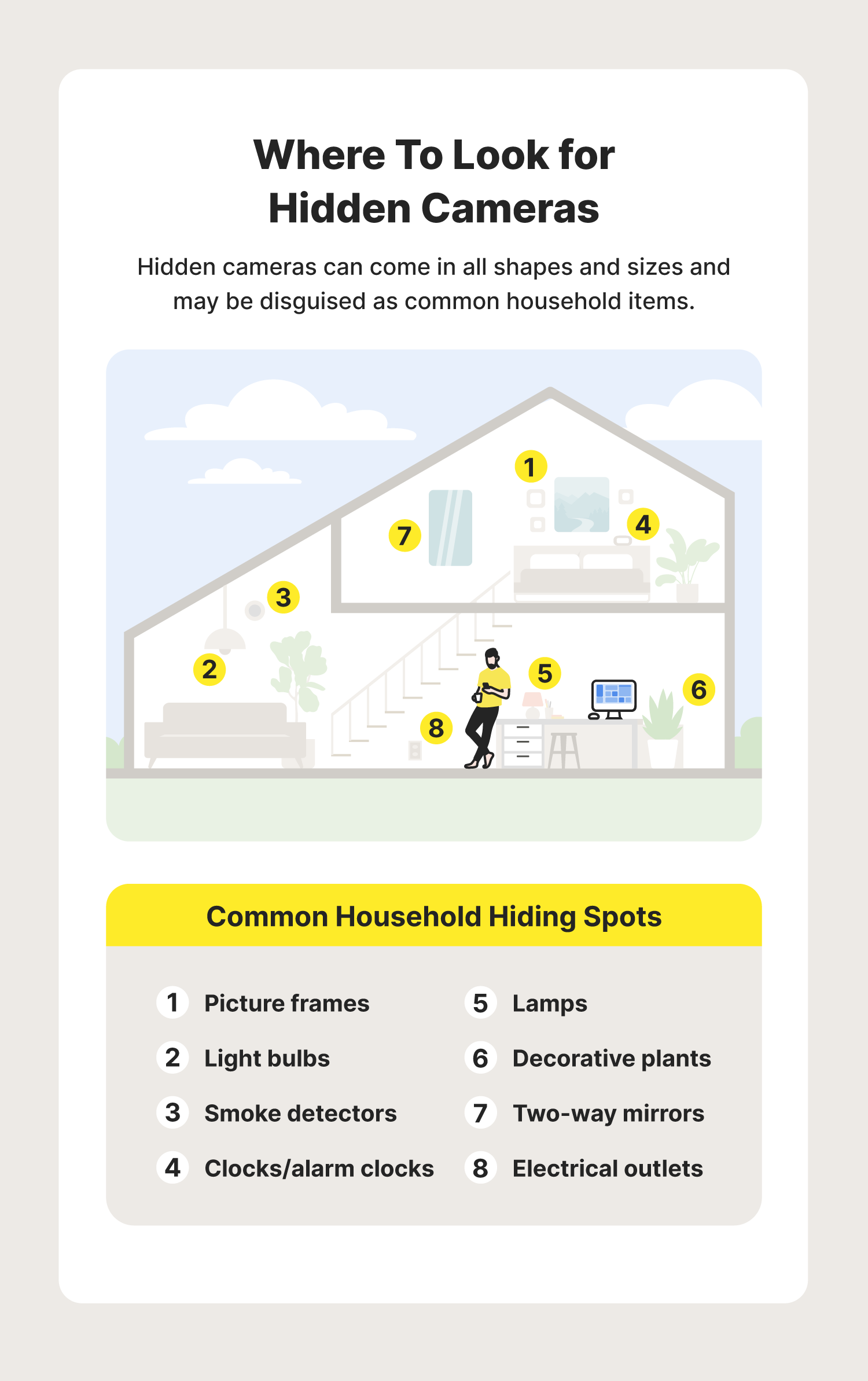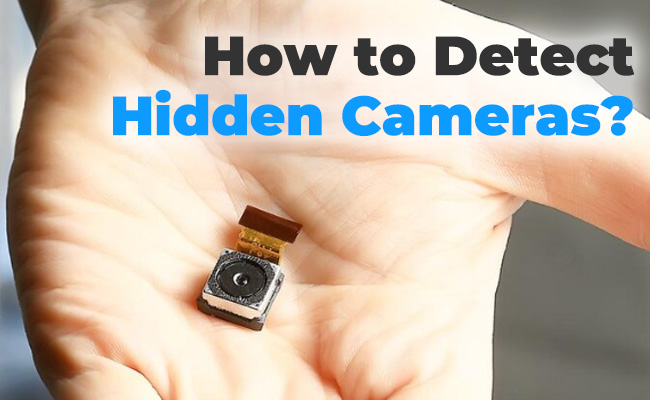To detect hidden cameras, use a radio frequency (RF) detector or a flashlight method. RF detectors pick up wireless signals emitted by cameras, while the flashlight method involves scanning a room with a flashlight to look for reflections from camera lenses.
In today’s world where privacy is a growing concern, it is important to be aware of potential hidden surveillance devices that could compromise your security. By understanding how to detect hidden cameras, you can take proactive steps to protect your privacy and personal information.
Being vigilant and knowledgeable about these detection methods can help ensure that your personal spaces remain secure and free from unauthorized surveillance. Let’s explore these methods further to better equip ourselves in safeguarding our privacy.
:max_bytes(150000):strip_icc()/how-to-detect-a-hidden-camera-on-android-devices-4590372-1-ecd3b840161b492dade7d8408300fdbe.jpg)
Credit: www.lifewire.com
Understanding Hidden Cameras
Hidden cameras can be difficult to detect, but there are methods you can use. Look for small, unusual objects in your surroundings and use a detection device to find any hidden cameras. Stay vigilant and protect your privacy.
Understanding Hidden Cameras Hidden cameras are a growing concern in today’s technologically driven world, where privacy violations can happen at any moment. These tiny devices are designed to discreetly capture audio and video without the knowledge of those being recorded. If you suspect the presence of a hidden camera, it is essential to understand how they work and the various types available. Let’s delve deeper into the subject to equip you with the knowledge you need to detect hidden cameras effectively.How Do Hidden Cameras Work?
Hidden cameras employ cutting-edge technology to capture covert footage. They generally consist of three primary components: a lens to capture the images, a recorder to store the data, and a power source. These cameras can be wired or wireless, with the ability to transmit the recorded feed to another device or store it internally. Depending on their sophistication, hidden cameras may also feature motion sensors to begin recording whenever movement is detected. Unauthorized cameras can be strategically placed in various objects, making it incredibly challenging to identify them with the naked eye. From wall clocks and smoke detectors to electrical outlets and even stuffed animals, the possibilities are endless. The compact size and inconspicuous designs of these cameras make them extremely difficult to spot without proper detection techniques.Types Of Hidden Cameras
Hidden cameras come in a wide range of shapes and sizes, making it crucial to have an understanding of the different types that exist. Here are some commonly used hidden cameras that you should be aware of: 1. Wireless Hidden Cameras: – They transmit data wirelessly, making them difficult to detect without proper equipment. – Can use radio frequency or Wi-Fi signals to transmit footage to a remote device. – Some wireless cameras can even be accessed remotely through a smartphone or computer. 2. Wired Hidden Cameras: – These cameras are physically connected to a recording device via cables. – The cables may be hidden within the walls, making detection more challenging. – Wired cameras are typically more reliable and have superior video quality compared to wireless counterparts. 3. IP Cameras: – IP cameras, also known as network cameras, are connected to the internet. – Offer remote viewing capabilities and can save recorded footage on a network storage device. – Can be accessed through a smartphone, tablet, or computer from anywhere in the world. 4. Spy Cameras: – Designed to be disguised as ordinary objects like pens, USB drives, or buttons. – Are often used for covert surveillance, investigations, or personal security. Identifying the type of hidden camera you may be dealing with can help in selecting the appropriate detection method to uncover the presence of these intrusive devices. In conclusion, understanding hidden cameras and how they operate is vital in detecting their presence effectively. Hidden cameras can be challenging to identify due to their miniature size and covert placement. By familiarizing yourself with how these cameras work and the various types available, you can improve your chances of discovering them and protecting your privacy.Signs Of Hidden Cameras
How to spot hidden cameras is a top concern for many in today’s tech-driven world. Whether you’re in a hotel room, Airbnb, or unfamiliar place, it’s important to recognize the signs of potential hidden cameras. By knowing what to look for, you can take steps to protect your privacy and safety.
Unusual Objects Or Decorations
One way to detect hidden cameras is to keep an eye out for unusual objects or decorations that seem out of place. Cameras may be disguised as everyday items, such as clocks, smoke detectors, or even electrical outlets. A thorough sweep of the location may reveal these hidden cameras.
Strange Sounds Or Blinking Lights
Another indicator of hidden cameras is strange sounds or blinking lights that seem abnormal in the environment. Unexplained noises or lights could point to the presence of a camera. Be vigilant for any unfamiliar sounds or lights as they may be a clue to the presence of covert surveillance.
Methods To Detect Hidden Cameras
Looking for methods to uncover hidden cameras? Start by performing a thorough visual sweep of the area, checking for any unusual or out-of-place items. Utilize a hidden camera detector to scan for any radio frequency signals, and consider using a smartphone app to detect reflective surfaces that could indicate a hidden camera.
Physical Inspection
Physical inspection involves visually searching the area for any suspicious objects.
Using A Hidden Camera Detector
Hidden camera detectors use radio frequency signals to identify the presence of hidden cameras.

Credit: nz.norton.com
Checking For Hidden Cameras In Different Settings
Checking for Hidden Cameras in Different Settings:
Preventive Measures
When it comes to protecting your privacy, taking preventive measures to detect hidden cameras is crucial. By being proactive, you can safeguard yourself from potential privacy breaches. There are several steps you can take to prevent unauthorized surveillance and ensure your safety.
Covering Up Camera Lenses
One effective way to detect hidden cameras is by covering up their lenses. When you enter a new space, take a few moments to look around for any suspicious objects such as small holes or unusual reflections, which may indicate the presence of a hidden camera. Using objects such as stickers, tape, or small decorative items can help to cover up the lenses of potential hidden cameras, thereby minimizing the risk of being spied on.
Using A Privacy Filter
Another preventive measure to detect hidden cameras is to use privacy filters. These filters can be installed on electronic devices with built-in cameras such as laptops, tablets, and smartphones. They work by limiting the viewing angle, making it more challenging for unauthorized individuals to capture your images or videos without your consent. Privacy filters are essential for protecting your privacy, especially in public places where surveillance may be a concern.

Credit: www.helpnetsecurity.com
Legal Issues
When it comes to detecting hidden cameras, it’s not just a matter of personal privacy but also of legality. Understanding surveillance laws is crucial in knowing what your rights are and how you can protect yourself. In this section, we will explore the key legal issues related to detecting hidden cameras and when it is appropriate to involve the authorities.
Understanding Surveillance Laws
Surveillance laws vary from country to country, and even within different states or regions. It’s important to familiarize yourself with the specific laws that apply to your jurisdiction. Generally, surveillance is subject to legal restrictions and limitations to safeguard individuals’ privacy rights.
In many places, it is perfectly legal to install security cameras in public spaces or within your own property, as long as they are not invading someone else’s privacy. However, when it comes to hidden cameras, the laws become more stringent.
Some key points to remember about surveillance laws include:
- Consent: In most cases, it is illegal to record or photograph someone without their consent, especially in areas where privacy is expected, such as bathrooms, hotel rooms, or changing rooms.
- Reasonable expectations of privacy: Hidden cameras are generally prohibited in locations where individuals have a reasonable expectation of privacy, such as bedrooms, offices, or locker rooms.
- Audiorecording: Laws regarding audio recording without consent also vary, so it’s essential to be aware of the specific regulations in your area.
When To Involve Authorities
Discovering a hidden camera can be an unsettling experience. Depending on the circumstances, involving the authorities may be necessary to protect your rights and ensure appropriate action is taken against the camera’s owner.
Here are some situations when involving the authorities is recommended:
- Violation of privacy: If you believe that someone has intentionally invaded your privacy by installing a hidden camera without your knowledge or consent, it is crucial to report this to the appropriate authorities.
- Suspicion of illegal activity: If you suspect that the presence of a hidden camera is linked to illegal activities such as voyeurism, harassment, or espionage, contacting the authorities is essential for your safety and potential legal action.
- Professional assistance: In some cases, it may be necessary to seek the opinion and expertise of professionals, such as private investigators or cybersecurity specialists, who can assist in identifying and addressing the hidden camera.
Remember, when dealing with legal issues related to hidden cameras, it is always best to consult with legal professionals who can guide you through the appropriate steps to protect your rights and ensure justice is served.
Conclusion
Being aware of your surroundings and using detection tools can help you identify hidden cameras. Regularly checking your space for any unusual objects and using a camera detector can go a long way in protecting your privacy. Stay vigilant and take necessary steps to ensure your safety.


0 comments